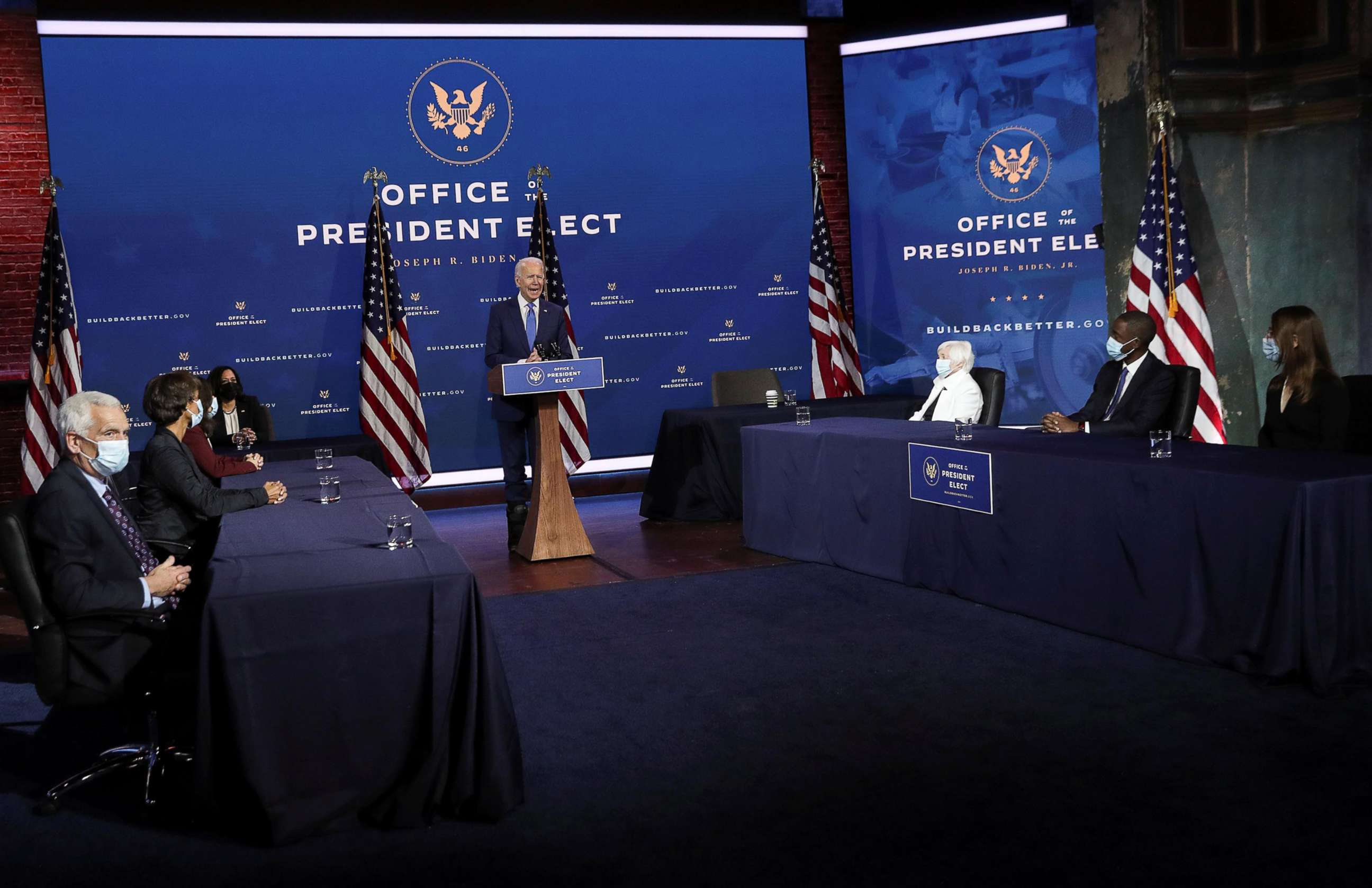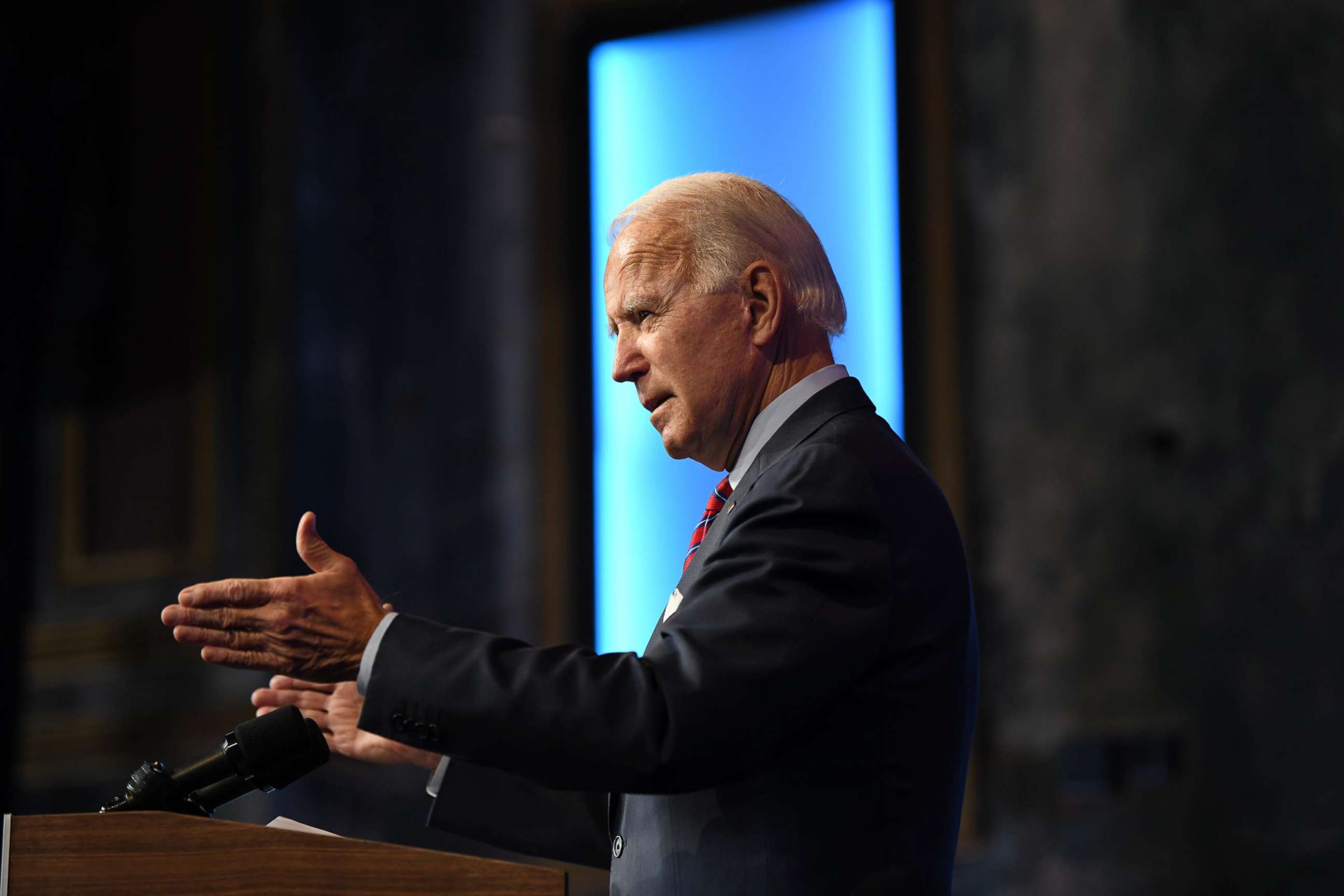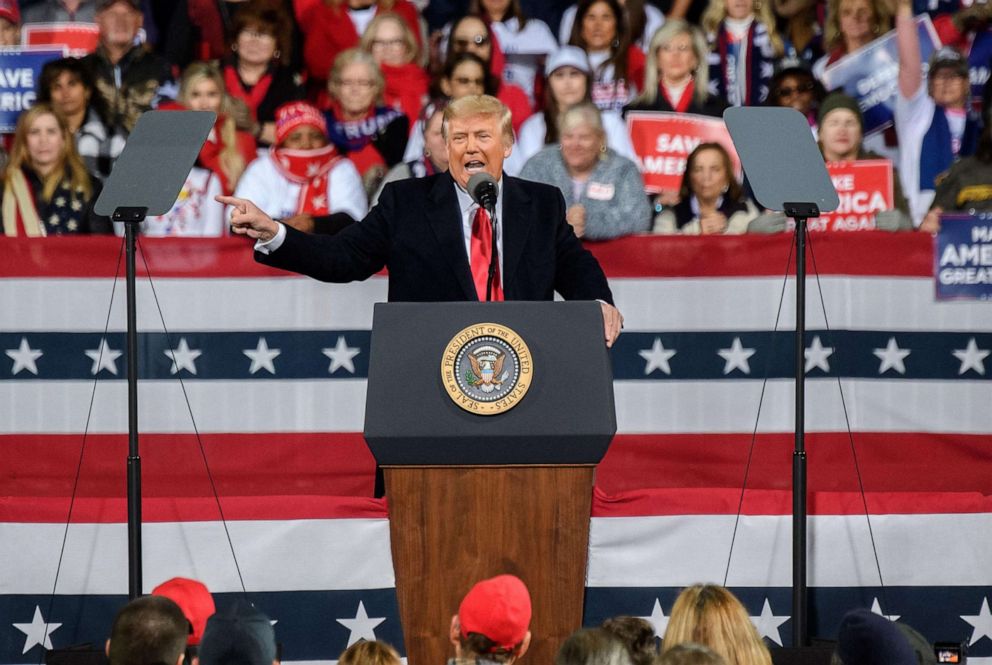The Note: Vaccine gets Trump’s hype but will test Biden
Trump’s hype and hyperbole will fade even as the long, dark winter continues.
The TAKE with Rick Klein
It might mark something of a torch-passing moment -- only the current bearer is trying to keep his flame alive, increasingly by himself.
President Donald Trump will host what's billed as a "vaccine summit" at the White House on Tuesday, just days before the Food and Drug Administration holds its first hearing on a COVID-19 vaccine.
But expected to be missing from the summit will be representatives of Pfizer and Moderna -- the two companies seeking emergency-use authorization -- as well as anyone from the incoming administration. It comes amid news that the Trump administration passed on a chance to purchase more vaccine doses from Pfizer over the summer, potentially pushing back the timeline for all Americans to be able to have access.

That leaves what will arguably be the more relevant show in Wilmington, Delaware, where President-elect Joe Biden on Tuesday will introduce the health care team he will entrust with handling the pandemic. Expected to dial into Biden's meeting -- though not the one at the White House: Dr. Anthony Fauci, whom Biden has asked to stay on in an expanded role.
The dueling events take place on a critical day on the post-election schedule. Tuesday is the congressionally mandated "safe harbor" deadline -- the date, under federal law, by which the "final determination of any controversy or contest concerning the appointment" of electors "shall be conclusive."
Of all the awkwardness of this transition -- driven in large part by the president's false insistence that he won the election -- the handoff of COVID vaccinations looks to be the most consequential. Whatever credit the president will claim for speeding things along, it will be left to Biden to help the nation get healthy again.
The real drama of the moment is less likely to be remembered for the events winding down in courts and state capitals. Trump's hype and hyperbole will fade even as the long, dark winter continues.
The RUNDOWN with MaryAlice Parks
Several civil rights leaders are meeting with Biden and Vice President-elect Kamala Harris Tuesday to discuss policy issues around racial equity as well as diversity and representation on the incoming cabinet.
Adding pressure to the moment, many leaders involved in the meeting have already announced they plan to talk to the press afterwards -- a clear sign that they are hoping for concrete outcomes and next steps.

The list for Tuesday's meeting includes, Marc H. Morial, president of National Urban League; the Rev. Al Sharpton, founder of National Action Network; Sherrilyn Ifill, president of the NAACP Legal Defense and Educational Fund; Vanita Gupta, president and CEO of The Leadership Conference on Civil and Human Rights; Derrick Johnson, president of the NAACP.
Biden's team has argued that the first few high-level staffing rollouts have shown a commitment to racial, ethnic and gender diversity. Overnight, news broke too that Biden is expected to name retired Army Gen. Lloyd Austin as his nominee for secretary of defense.
If confirmed, Austin would be the first Black defense secretary in American history. His nomination would not be without controversy, however. Many in the national security field have questioned whether a recently retired military official should assume this role, which was designed to ensure civilian leadership over the nation's armed services.
Austin would need a waiver from Congress to lead the Pentagon, given that he is less than seven years from active duty and several sitting senators have spoken out about their hesitancy to grant such waivers after one was approved for retired Marine Gen. James Mattis in 2017.
The TIP with Kendall Karson
Trump's efforts to avoid his electoral fate -- and confront a reality that continues to become more apparent -- meets one of its final roadblocks on Tuesday. Six days before the Electoral College is set to meet on Dec. 14, federal law outlines a specific deadline for states to certify their election results in order to avoid legal challenges down the road when Congress counts the electoral votes and is able to contest a slate of electors. Those electors certified by the "safe harbor" date are considered conclusive -- making it extremely difficult to dispute in the courts.
But don't expect much fanfare on Tuesday. The date is marked by little beyond states submitting "Certificates of Ascertainment" to the National Archives a formal document certifying their state's electors for either Trump or Biden. The archivist of the United States has received certificates from at least 21 states -- including five that are in the president's crosshairs for election challenges: Arizona, Georgia, Michigan, Pennsylvania and Wisconsin.

In another battleground that has seen challenges post-election, Nevada's governor did not respond to ABC News' multiple inquiries on Monday about whether they submitted their documentation after certifying their election results on Nov. 24 and Democratic Gov. Steve Sisolak signing the certificate on Nov. 25. Some states may take longer to send in the paper record and most deliver it in time to be posted online before next week's virtual gathering across the 50 states plus the nation's capital.
The weight of the safe-harbor deadline is not only because of its roots in the Electoral Count Act of 1877, which sought to avoid another constitutional crisis after the election of 1876, but also its prominence in close election challenges. The last time the safe harbor provision played a crucial role in an election came in 2000, when the contested election in Florida was settled by the Supreme Court on the date that year: Dec. 12. The nation's highest court issued a still-debated decision, which effectively ended the recount process due to the impending safe-harbor date, and paved the way for George W. Bush to win the White House.
This time, it is likely to further safeguard Biden's victory, despite possible objections that might be expected in Congress in early January.
The PLAYLIST
ABC News' "Start Here" podcast. Tuesday morning’s episode features ABC News Chief Investigative reporter Josh Margolin, who tells us why the White House reportedly turned down additional doses of Pfizer’s COVID-19 vaccine over the summer. ABC News’ Luis Martinez breaks down President-elect Joe Biden’s upcoming pick for Secretary of Defense. And ABC News’ Andrea Dresdale examines the move by Bob Dylan and others to sell their songwriting catalogs. http://apple.co/2HPocUL
WHAT YOU NEED TO KNOW TODAY
Download the ABC News app and select "The Note" as an item of interest to receive the day's sharpest political analysis.
The Note is a daily ABC News feature that highlights the key political moments of the day ahead. Please check back tomorrow for the latest.



